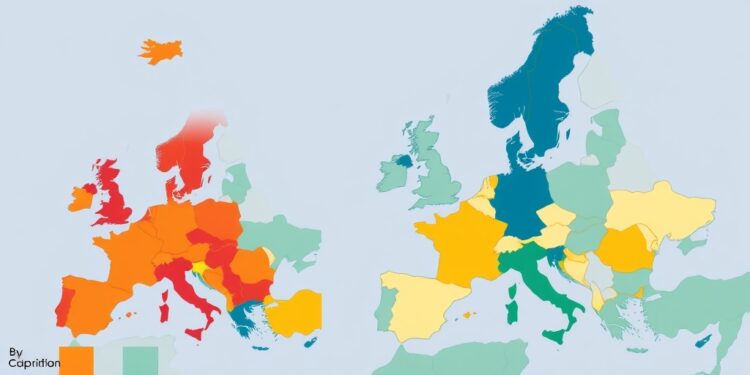A recent study presented at the European Psychiatric Association Congress 2025 has brought to light significant socioeconomic disparities affecting access to mental health care across European Union nations. The findings indicate that financial obstacles are particularly burdensome for lower-income populations, revealing a pressing need for policy makers to address these inequalities to enhance mental health service accessibility.
The prevalence of mental health disorders in the EU is substantial, with OECD data indicating that approximately 17% of EU citizens were grappling with mental health conditions as of 2018. The economic ramifications of mental illness are far-reaching, costing EU member states over 4% of their GDP annually. This underscores the necessity for national and European strategies to tackle mental health issues, especially given the stark disparities illustrated in the research.
Led by João Vasco Santos of the University of Porto, the study utilized a retrospective, cross-sectional methodology to assess the unmet mental health care needs within EU countries, focusing specifically on 2019 data from the European Health Interview Survey. The research scrutinized various socioeconomic factors, including income levels, educational attainment, and urban versus rural living environments, revealing that these factors significantly influenced individuals’ unmet needs for mental health assistance.
The most startling revelation from the study was the gradient of unmet mental health needs across the continent. Portugal topped the list with a staggering 27.8% of respondents reporting unmet needs, while Romania reported only 1.1%. The average across the studied countries was a median of 3.6%, which highlights the variation in accessibility and indicates that stark differences exist between nations, reflecting local health policies and socioeconomic contexts.
Income inequality emerged as a critical factor determining access to mental health care. The analysis demonstrated that almost all countries examined had higher self-reported unmet needs among the lowest income quintiles. Greece particularly illustrated the extremes of this issue, showing the highest income-related disparity with an inequality ratio of 23.8. By focusing on economic status, the study shed light on how financially constrained individuals often forego necessary mental health care due to costs, further entrenching their conditions and reducing opportunities for recovery.
Education was another pivotal aspect examined, revealing that lower educational attainment frequently correlated with higher unmet mental health care needs. The investigation found that 15 out of the 26 countries in the study indicated this trend, with Bulgaria showcasing the most pronounced educational disparity. These findings imply that individuals with lower education levels not only possess less awareness about mental health resources but also face greater challenges in advocating for their own health care needs.
The geographical component of the research uncovered another layer of complexity in this issue. The research demonstrated that rural populations generally reported lower unmet needs compared to those living in urban environments. This disparity reveals the nuanced differences in resource distribution and accessibility between city and countryside, with rural citizens often facing other barriers, such as limited service availability and transportation challenges.
The implications of these findings are profound, calling for an urgent response from policymakers. João Vasco Santos emphasized the need for targeted strategies to tackle these socioeconomic disparities in mental health care access. Eliminating the financial barriers is fundamental to improving patient outcomes, alongside enhancing mental health literacy to equip individuals with the knowledge necessary to seek help. Addressing this issue means not only augmenting available services but also implementing community-driven approaches that resonate with diverse populations.
Dr. Julian Beezhold, Secretary General of the European Psychiatric Association, reinforced the significance of these findings, remarking on the multipartite nature of the socioeconomic factors affecting mental health service access. He stressed that comprehensive public health strategies are vital for dismantling systemic barriers to care. This means tackling stigma surrounding mental health and employing culturally sensitive methodologies that foster inclusivity within varying communities throughout the EU.
Overall, the research underscores a critical understanding of how diverse socioeconomic determinants impact mental health across Europe. Policymakers are urged to recognize these urgent disparities and act decisively to promote equitable access to mental health services for all EU citizens. There is a clear necessity for more equitable health frameworks that address income, education, and geography simultaneously to foster a more comprehensive resolution to these pressing public health challenges.
As the European Congress of Psychiatry continues in Madrid this week, the findings from this study serve as a potent reminder of the work still needed to create a truly equitable mental health landscape across all member states. Mental health care remains a fundamental human right, and the evidence presented underscores a collective responsibility to ensure that it is accessible to every individual, regardless of their socioeconomic background or geographical location.
Through concerted efforts at various levels – from national governments to local communities – there is hope for a future where mental health services are universally accessible, thereby supporting the well-being of all citizens and contributing positively to the overall health landscape of the European Union.
Subject of Research: Socioeconomic inequalities in unmet needs for mental health care
Article Title: Socioeconomic Inequalities Drive Significant Gaps in Access to Mental Health Care Across the European Union
News Publication Date: Monday, 7 April 2025
Web References: European Psychiatric Association Congress
References: OECD figures from 2018, European Health Interview Survey 2019
Image Credits: [Not Provided]
Keywords: Mental Health, Socioeconomic Inequalities, EU Health Policy, Access to Care, Education, Income Disparity, Public Health Strategy, Rural Urban Divide




